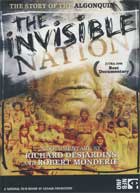
The Invisible Nation 2007
Distributed by National Film Board of Canada, 1123 Broadway, Suite 307, New York, NY 10010; 800-542-2164
Produced by Colette Loumede
Directed by Richard Desjardins and Robert Monderie
DVD, color, 93 min.
College - Adult
Canadian Studies, History, Human Rights, Law, Multicultural Studies, Native American Studies, Political Science, Sociology
Date Entered: 03/11/2009
Reviewed by Douglas Reed, Department of Political Science, Ouachita Baptist University, Arkadelphia, ARThe Invisible Nation is a carefully documented history of the Algonquin tribe in Canada and their centuries-old quest for basic rights.
The film traces the Algonquin plight back to provincial and federal government policies that have impacted today’s tribe. In many instances, government officials have not honored Algonquin land treaties. In other cases, political leaders have re-negotiated these agreements to the disadvantage of the tribe. Moreover, forced assimilation tactics have devastated the Algonquin culture. As a result, most of Canada’s Algonquin have an abysmal existence as evidenced in a myriad of startling statistics – infant mortality, unemployment, and suicide. Quite telling are comparisons of the Algonquin to Canadian national averages. Taken as a whole, the Canadian Algonquin can be likened to a third world country.
Showing the full range of living conditions across Canada’s ten Algonquin communities is an important element in The Invisible Nation. Rather than give a narrow snapshot of a few Algonquin settlements, the film provides an encompassing picture of the tribe. The more desirable communities have larger land areas, clear titles to the land, and economic opportunities. At the other extreme, some Algonquin groups are considered squatters and have limited access to basic necessities. As one tribal member notes, it is easier in his community to purchase cocaine than flour.
Visually, The Invisible Nation effectively captures the hardship and resolve of the Canadian Algonquin. The documentary’s rich collection of archival footage and historic photographs are a huge contrast to its breathtaking aerial views of the Canadian landscape the tribe seeks to call their own.
The Invisible Nation was the best documentary winner at the 2008 Soiree des Jutra in Montreal. The film also won awards in the society and original music categories at the 2008 Prix Gemeaux in Montreal.
Highly recommended for academic and public libraries, The Invisible Nation is also an outstanding resource for courses in history, government, and sociology.